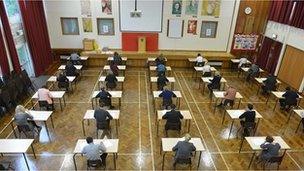GCSE change: Unis and firms 'will adapt to shake-up'
- Published

A review is under way about possible changes to GCSEs in Wales
Universities and employers will be able to adapt if Wales has its own system of qualifications, says a teaching union.
The UK government is due to announce replacement of GCSEs with a single end-of-course exam from 2015, and the Welsh government will decide on their future in November after completing a review.
But Anna Brychan, of the National Association of Headteachers in Wales, says it is not about events in England.
The issues were what students learn, skills, and how to measure success.
Ms Brychan said it was not about comparing one model against another, and it was "entirely fair enough" if Wales wanted a different one.
"There will be some concern about departing from a model that we have known for a long time," she told BBC Radio Wales.
She added that every country in the world had a distinct education system and any system in Wales needed to be workable.
"We have to make sure that the qualifications are respected, that they give employers and further education institutions and higher education institutions the skills of the students they want," she said.
She said it was "perfectly feasible" for Wales to create a different system.
The changes in England, which are due to be announced by Westminster Education Secretary Michael Gove later, will see the current GCSEs replaced with what ministers claim will be a more rigorous system.
Assessment will be based on an O-level style single end-of-year exam.
Welsh Education Minister Leighton Andrews has previously said that whatever comes from the Welsh government's review, Wales will not return to O-level-style exams.
The changes in England come amid controversy over this year's GCSE exams in English and whether they were too harshly graded.
'Undermine confidence'
Examiners in Wales have been regrading English papers taken under the WJEC examining board, after Mr Andrews ordered a review of results.
Mr Gove attacked that decision, saying it would "undermine confidence" in the value of the qualifications obtained by the students involved.
Prof Ken Reid, a reader in education at Swansea Metropolitan University, defended GCSEs.
"The problem is the right [wing] of politics haven't been happy with GCSEs, particularly since it was modularised a few years ago, because they believe it has become too easy," he told Good Morning Wales.
"At the moment, the feeling inside Wales is the present GCSE system is satisfactory for our needs.
"I think there will be some changes made to the whole qualification system in Wales in the near future as a result of this review.
"I think we will stick with the GCSE but may move towards the Scottish system and I think the Welsh baccalaureate will stay in the mix.
"It has become very important because the minister is particularly keen to emphasises the skills element and particularly emphasise pupils' literacy and numeracy."
- Published17 September 2012
- Published16 September 2012
- Published16 September 2012
- Published22 June 2012
- Published15 September 2012